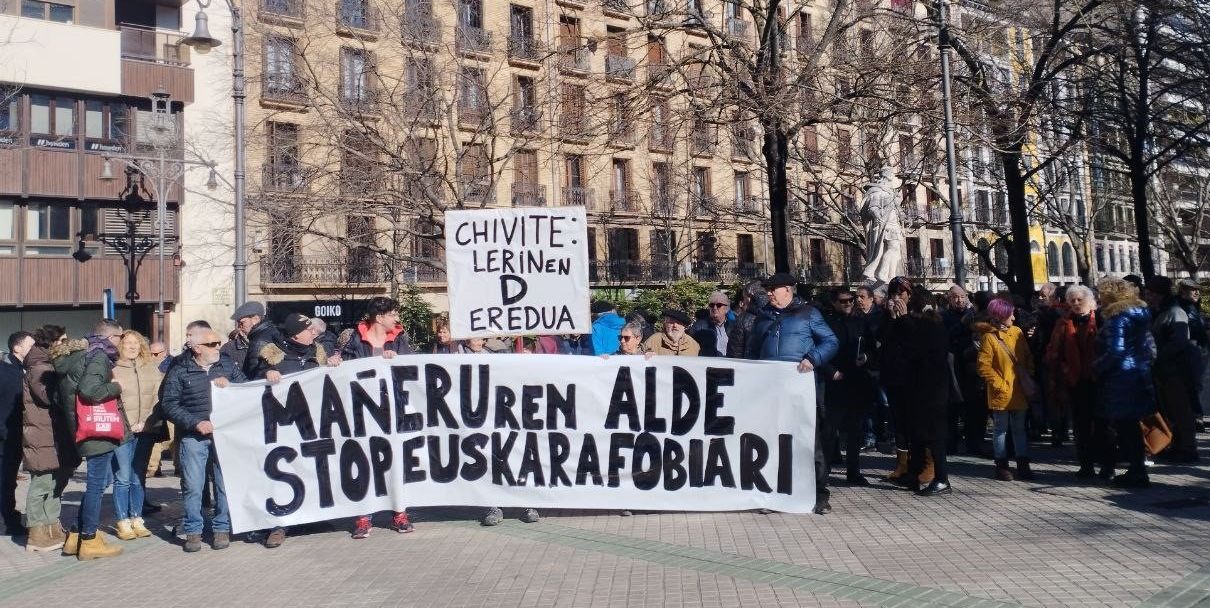
- After exposing the vision of each group, it was voted on this Thursday in the Parliament of Navarra and UPN and PSN voted against. Geroa Bai, EH Bildu, Ahal Duguk and Left-Ezkerra in favor. Thus, the unanimous request of the City of Mañeru to enter the mixed area is rejected.

What has been announced about the vote has happened, and the dialectical struggle between the present government, Geroa Bai and the PSN, has been enormous. Geroa Bai parliamentarian Jabi Arakama defended the proposal to include Mañeru in the mixed area and accused the PSN of going hand in hand with UPN and being full of complexes. Inma Jurio, from the PSN, replies that Geroa is making political use of the subject and that the Socialists are comfortable with the Law of the Basque Country, which is the one that puts his father, because it adequately reflects the sociolinguistic situation of Navarra.
Jurio qualifies the PSN proposal as an electorate and accuses Geroa Bai of taking it to the door of the elections. Arakama responds that they wanted to take them to the plenary long before, but that the PSN asked them for time to study the subject well. The Basque law has been modified in the years 2010, 2015 and 2017, to include in all of them new municipalities in the mixed zone. Arakama reminds PSN that in 2010 Roberto Jiménez’s PSN acted better than Chivite’s PSN. That then Jimenez clearly said that if the municipalities approved the change, the PSN would not oppose, but now it is against, above the municipal autonomy of Mañeru and the popular will.
The PSN has argued that the proposal comes at the end of the legislature, but Arakama has reminded him that on Thursday another four laws would be voted and that, at least, they will be processed before the end of another five legislatures, but that the Socialists had no problems with them, “with the Basque yes.”
Socialists have mainly argued socialist reasons for refusing to change, but Arakama has reminded them that Mañeru is like the surrounding villages, and that from now on, besides good forecasts, 65% of children are enrolled in model D and the rest in model A (Euskera is a subject). According to sociolinguistic data, in Mañenu 10% knows Basque and another 10% understands it, according to Arakama. In addition to the request of the City Hall, according to a survey by Euskarabidea, two-thirds of the Mañeru are supporters of moving to the mixed area.
The PSN Jurio parliamentarian replies firmly and responds that in the last parliamentary term the government of Uxue Barkosen did not take Mañeru to the mixed area, when more than half of the population decided with a signature: “Why? You are full of complexes!” And Arakama said, “The City Hall did not make that request and we could not decide that with democratic respect.”
Jurio: “Do not compare Basque rights with social rights”
For Jurio the Basque Government is a supreme objective for Basque nationalists, but it does not understand what Ahal Duguk and Left-Ezkerra are doing in this perspective, “told them that they are paying the toll” and that the Basque rights are not comparable to those of guaranteed income or other social rights. “We will be respectful of the sociolinguistic reality of Navarre and that is why we will deny the proposal,” concludes Jurio.
Iriarte (UPN): “Non-Basque people fear these changes”
As usual, the parliamentarian of Navarra Suma, Iñaki Iriarte, stressed that these kinds of proposals are confronted with each other. He pointed out that 26% of Pamplona’s citizens recognize a level of English knowledge and therefore do not ask to adapt to this reality. Remember that in Mañeru the Basques are a much smaller minority.
During Deia, the driving forces stated on several occasions that access to the mixed area of Mañeru did not harm those who did not know Euskera, while the rights of the Basques would be better guaranteed. But, according to Iriarte, in these areas non-Basque people fear the damage that these changes can bring. Because this may entail other obligations for them, which is the real sudoku to resolve. “All the progress made in the Basque country for the Basque nationalists is progress in the national construction”, but considers that this progressively leads us to “confrontation”.
According to Iriarte, the Basque Law of 1986 was very generous in setting the limits of the Vascophony zone. He reaffirmed that they would reject the proposal: “It is not good that these changes to coexistence should be made in an agile manner.”
Bakartxo Ruiz: "Voluntary and free"
The PSN says that these steps should be taken voluntarily and freely, and in his turn, Bakartxo Ruiz de EH Bildu responded that in this case he is doing it, and that there is no reason to reject the unanimous request by the City Hall of Mañeru: "Where is the scandal?" Ruiz has accused the PSN of taking a step forward on the Euskera issue and two others back, and has reaffirmed that it is a good time to make the change, if requested by the city council.
The debate can be seen in the following link, from around the 4th minute: